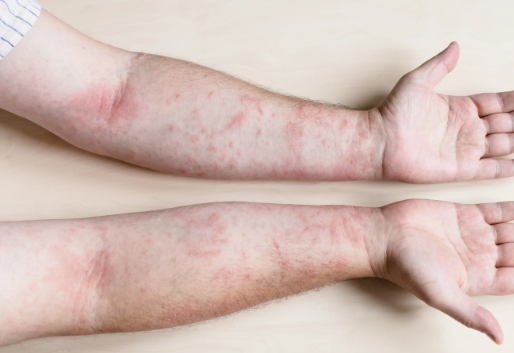Eczema

Understanding Eczema: Causes, Symptoms, and Treatments
Introduction
Eczema, also known as atopic dermatitis, is a chronic skin condition characterized by red, itchy, and inflamed patches of skin. It is most common in children but can occur at any age. Eczema is often linked to an overactive immune response and can be triggered by various environmental or internal factors.
Causes of Eczema
- Genetics:
- Eczema often runs in families, indicating a genetic predisposition to the condition.
- Immune System Dysfunction:
- An overactive immune system can lead to inflammation and irritation, causing eczema symptoms.
- Environmental Factors:
- Allergens and Irritants: Pollen, pet dander, mold, dust mites, and certain fabrics can trigger eczema.
- Weather: Cold, dry air can lead to flare-ups, while hot, humid conditions can also aggravate the skin.
- Chemical Irritants: Soaps, detergents, perfumes, and skincare products with harsh chemicals can irritate sensitive skin.
- Skin Barrier Dysfunction:
- People with eczema often have a compromised skin barrier, which allows moisture to escape and makes the skin more vulnerable to irritants and allergens.
- Stress:
- Psychological or emotional stress can trigger or worsen eczema flare-ups.
- Hormonal Changes:
- Changes in hormone levels, such as during pregnancy or menstruation, may trigger or worsen eczema symptoms.
Symptoms of Eczema
- Itchy Skin: Intense itching, which can worsen at night.
- Red or Brownish Patches: Typically appear on the hands, feet, ankles, wrists, neck, upper chest, eyelids, and inside bends of elbows and knees.
- Dry, Scaly Skin: The affected areas may become thickened, cracked, and dry due to repeated scratching.
- Oozing or Crusting: Severe cases can lead to fluid-filled blisters that ooze or crust over.
- Swelling and Inflammation: The skin may become swollen and inflamed during flare-ups.
Types of Eczema
- Atopic Dermatitis: The most common form, often associated with asthma and hay fever.
- Contact Dermatitis: Triggered by contact with allergens or irritants.
- Dyshidrotic Eczema: Characterized by small blisters on the hands and feet.
- Nummular Eczema: Coin-shaped spots of irritated skin that can become itchy and scaly.
- Seborrheic Dermatitis: Affects the scalp, face, and chest, causing dandruff and red, scaly patches.
- Stasis Dermatitis: Caused by poor circulation in the lower legs, leading to swelling and irritation.
Home Remedies and Lifestyle Changes for Eczema
- Moisturize Regularly:
- Use thick, fragrance-free creams or ointments to lock in moisture and strengthen the skin barrier.
- Take Lukewarm Baths:
- Avoid hot water, which can dry out the skin. Use gentle, hypoallergenic cleansers, and apply moisturizer immediately after bathing.
- Avoid Scratching:
- Scratching can worsen inflammation and increase the risk of infection. Keeping nails short and using cold compresses can help reduce itching.
- Wear Soft, Breathable Fabrics:
- Choose clothing made from cotton or other natural fibers to avoid irritation from rough fabrics like wool.
- Manage Stress:
- Practice relaxation techniques like yoga, meditation, or deep breathing to manage stress, which can trigger flare-ups.
- Identify and Avoid Triggers:
- Keep a journal to track what triggers flare-ups and avoid contact with known allergens and irritants.
Clinical Treatments for Eczema
- Topical Corticosteroids:
- Anti-inflammatory creams or ointments that help reduce redness, swelling, and itching during flare-ups.
- Topical Calcineurin Inhibitors:
- Non-steroidal creams like tacrolimus (Protopic) and pimecrolimus (Elidel) can reduce inflammation and are often used for sensitive areas like the face and eyelids.
- Antihistamines:
- Oral antihistamines can help relieve itching, especially at night when it can interfere with sleep.
- Wet Wrap Therapy:
- This involves applying medicated cream to the affected areas, covering them with wet bandages, and then wrapping with dry bandages. This method helps moisturize and soothe the skin while allowing better absorption of topical medications.
- Light Therapy (Phototherapy):
- Exposure to controlled amounts of natural or artificial ultraviolet light can help reduce symptoms for those with moderate to severe eczema.
- Systemic Medications:
- For severe cases, oral or injectable medications such as corticosteroids, cyclosporine, or biologics like dupilumab (Dupixent) may be prescribed to suppress the immune system and reduce inflammation.
- Antibiotics:
- If the skin becomes infected due to scratching, oral or topical antibiotics may be needed to treat the infection.
Alternative/Non-Invasive Treatments for Eczema
For eczema, the therapies offered by Earl Claytont Wellness Centre that may help manage symptoms and support skin health include:
- Full Spectrum Infrared Sauna:
- Infrared saunas promote detoxification, improve circulation, and reduce inflammation, which can help soothe eczema flare-ups. The heat can also ease itching and improve overall skin hydration and texture.
- PEMF (Pulsed Electromagnetic Field Therapy):
- PEMF therapy can reduce inflammation, promote skin healing, and enhance circulation, which may help alleviate the irritation, redness, and itching associated with eczema.
- Vitamin B Complex:
- B vitamins, especially B12 and B6, are vital for skin health and immune function. Supplementing with a B Complex may improve the skin's ability to heal and reduce eczema flare-ups by supporting the skin’s natural barrier.
- NAD+ Therapy:
- NAD+ therapy supports cellular repair and regeneration, which can help improve skin health and reduce inflammation. This therapy may assist in repairing damaged skin and reducing the symptoms of eczema.
These therapies can help manage eczema by promoting skin healing, reducing inflammation, and supporting the skin’s natural defenses.
Discover the perfect treatment for you with a FREE MEDICAL ASSESSMENT! Limited slots available – secure yours now by scheduling an appointment. Click below to book now!
When to Seek Medical Attention
- If eczema symptoms are severe, interfere with daily life, or if over-the-counter treatments don’t help, it’s important to consult a healthcare provider. They can diagnose the severity of the condition and recommend more advanced treatments, such as prescription medications or phototherapy.
Conclusion
Eczema is a chronic skin condition that requires ongoing management through a combination of home remedies, lifestyle adjustments, and clinical treatments. With proper care and the avoidance of triggers, most individuals with eczema can control their symptoms and reduce the frequency of flare-ups. Regular consultations with a healthcare provider are key to managing severe cases and finding the best treatment plan for long-term relief.

